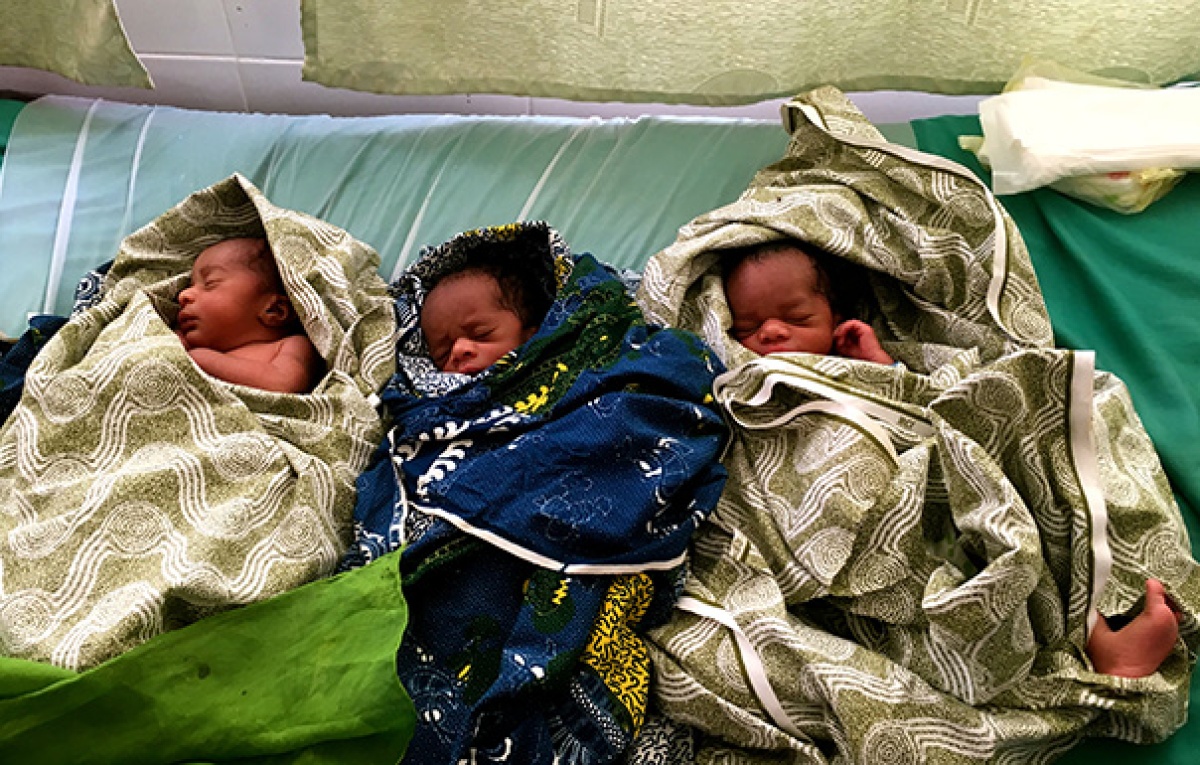Three Boys, Three Joys: Triplets Born in Liberia
Posted on Dec 22, 2016

On a hot and humid Monday in early December, 28-year-old Elizabeth Sieh climbed the handful of stairs to her neighborhood health center in southern Liberia and nurses in the admitting area could tell, immediately, that this was no ordinary pregnancy. The petite woman’s belly was really big. Maybe she was carrying twins? Or maybe a disease such as hepatitis had enlarged her liver? Neither, it turned out. An ultrasound at J.J. Dossen, a PIH-supported hospital down the road, revealed that Sieh was 33 weeks pregnant with triplets.
Roughly one in 8,000 births globally are naturally occurring triplets. In the United States, most are delivered prematurely via scheduled cesarean section. Thanks to great strides made over the past year, the staff at J.J. Dossen helped Sieh deliver in much the same way as in the U.S., albeit with a little extra preparation and no battalion of experts on call.
After conferring with her and J.J. Dossen medical director Dr. Methodius George, PIH’s Dr. Ben Huntley scheduled Sieh for a cesarean section that Friday. As per standard procedure, he also started her on steroids, hoping the drugs would accelerate the growth of the babies’ lungs.
While Sieh rested for four days, arrangements were made. An engineer hooked up the autoclave that sterilizes large batches of surgical instruments. The operations team bought gas for the newly installed generator, which was needed to run, among other things, the operating room’s air conditioner. (It wasn’t unheard of for a surgeon to suffer heat exhaustion in the 90-degree heat and leave the operating room in the middle of surgery to cool down.) The procurement team found appropriate sutures in the capital, and a charity group flew them to the hospital for free. Both of the adjoining operating rooms in the newly refurbished ward were prepped and 14 staff were enlisted—anesthesiologists, doctors, nurses, and three two-person teams, who would try to resuscitate the babies, if necessary.
On Friday, Sieh, as calm as ever, was put under anesthesia. Huntley made his first incision. Five minutes later, Baby A, a boy, came out weighing almost 5 pounds. To everyone’s relief, he promptly began crying.
The surgeon continued. He reached in for Baby B, lifted out another boy, and clamped and cut the umbilical cord. Pediatrician Rebecca Cook dried off and swaddled the boy, who was a couple of ounces smaller than his brother. “This baby is going to need a lot of help,” she announced as she carried him to the resuscitation table in the adjoining OR. He wasn’t breathing.
Minutes later, the surgeon held up Baby C, also a boy. He weighed hardly 4 pounds. No amount of rubbing could stimulate him to breathe.
The rooms were quiet as the surgeon stitched up Sieh, and the teams worked on the two little boys. Each lay on his own table, with a clinician flanking either side. On both teams, one person pushed air into a baby’s tiny lungs with a squeeze bag and face mask while another felt for a fast pulse in the stub of the infant’s umbilical cord, which would indicate that the babies were moving oxygenated blood throughout their bodies themselves. But for seven long minutes, everyone’s eyes were cast down at the newborns.
Then, suddenly, from underneath the face mask, Baby C let out a squeaky cry. The clinicians removed the mask, but his breath was still weak, so they continued with the mask until he flexed his arms and legs, frowned, and gave a proper sob. Within a minute, Baby B did likewise.
The whole room relaxed. There was still much to do, but all the boys were breathing on their own.
After a night in incubators, the sons rejoined their mother and soon began to gain weight. On December 22, a smiling Sieh and her healthy little boys—named Ben, George, and Doboh, after clinicians in the delivery room—were discharged. PIH staff drove them home, stopping along the way at Sieh's neighborhood health center, where the midwifery staff got to see her, a belly lighter and three sons richer, and schedule follow-up visits.
|

